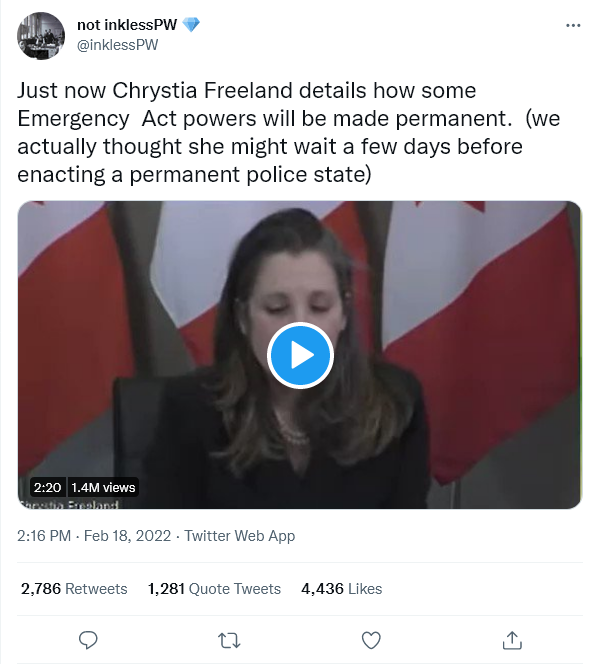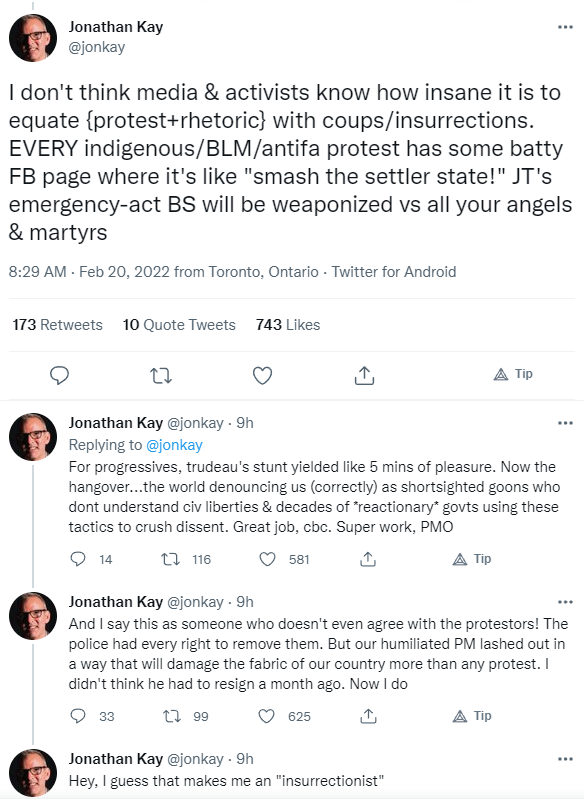The Canadian government under Justin Trudeau took advantage of a peaceful protest in the streets of Ottawa to invoke the Emergencies Act, the modern-day successor to the War Measures Act (which itself had only ever been used three times). Nothing the police have done in Ottawa since the emergency was declared required the powers enabled under the legislation, but apparently the protest was just a pretext to let the government do what it really wanted to do anyway:
The regular weekly round-up from The Line was delayed until Saturday as the events in Ottawa were far too fast-moving to summarize at that point. Here’s part of the later newsletter:
As the protest in Ottawa winds down, your Line editors are beginning to ask themselves, perhaps too optimistically: what happens after the emergency is over?
The Liberal government has arrogated to itself enormous powers through the Emergencies Act: the most notable among them, the ability to freeze assets of protest participants without any kind of prior judicial approval or warrant. It’s not entirely clear to us what would constitute an offence that the government would consider serious enough to justify using this power.
If someone gave $500 to the protest movement three weeks ago, would that merit freezing a bank account? Is the number $5,000? Or $50,000? Would this act apply to independent media livestreaming the protests?
Complicating matters, on Wednesday, Justice Minister David Lametti gave an interview with CTV’s host Evan Soloman. Solomon asked whether ordinary people who donated to the trucker convoy should be worried about the provisions in the Emergencies Act. Lametti responded:
“If you are a member of a pro-Trump movement who is donating hundreds of thousands of dollars, and millions of dollars to this kind of thing, then you ought to be worried,” said Lametti.
Excuse us, but … wtf?
Threatening people who are donating cash to anything that can be construed as a “pro-Trump” movement suggests that attempts to freeze assets aren’t directed toward criminal behaviour, but are rather politically motivated.
We asked Lametti’s office for response to his “pro-Trump” comments and this was his response:
“We always ask our police forces as well as our prosecutors to act reasonably, where they’re going to work with the banks to ensure that they act reasonably. Obviously there are going to be judgment calls that will be made and serious contributors will be treated more seriously. But, as always, we’re going to leave it to law enforcement to work with the banks, as they already do in other areas that already exist. Such as in anti-terrorism financing and in other areas through FINTRAC.”
This is, frankly, not much of an answer. It amounts to “we will be reasonable. Trust us!”
Well, we don’t. We don’t trust NDP leader Jagmeet Singh to hold this government to account in Parliament. We don’t trust the left to clue into the fact that the tactics used against the convoy will be used against their causes in turn. We don’t trust conservatives to show more principle or restraint when in power.
David Sacks, posting at Bari Weiss’s Common Sense blog, says that the federal government’s moves to seize bank accounts is a clear sign that we’re having a Chinese-style “social credit” system imposed on us:
Last summer, I warned readers of Common Sense that financial deplatforming would be the next wave of online censorship. Big Tech companies like PayPal were already working with left-wing groups like the ADL and SPLC to define lists of individuals and groups who should be denied service. As more and more similarly minded tech companies followed suit (as happened with social media censorship), these deplorables would be deplatformed, debanked, and eventually denied access to the modern economy altogether, as punishment for their unacceptable views.
That prediction has become reality.
What I could not have anticipated is that it would occur first in our mild-mannered neighbor to the north, with the Canadian government itself directing the reprisals. It remains to be seen whether Canada will be a bellwether for the U.S. But anyone who cares about the future of America as a place where citizens are free to protest their government needs to understand what has just occurred and work to stop it from taking root here.
[…]
Trudeau escalated things further on Tuesday night, when he issued a new directive called the Emergency Economic Measures Order. Invoking a War on Terror law called the Proceeds of Crime and Terrorist Financing Act, the order requires financial institutions — including banks, credit unions, co-ops, loan companies, trusts, and even cryptocurrency wallets — to stop “providing any financial or related services” to anyone associated with the protests (a “designated person”). This has resulted, according to the CBC, in “frozen accounts, stranded money and canceled credit cards”.
Banks, according to this new order, have a “duty to determine” if one of their customers is a “designated person”. A “designated person” can refer to anyone who “directly or indirectly” participates in the protest, including donors who “provide property to facilitate” the protests through crowdfunding sites. In other words, a designated person can just as easily be a grandmother who donated $25 to support the truckers as one of the organizers of the convoy.
Because the donor data to the crowdfunding site GiveSendGo was hacked — and the leaked data shows that Canadians donated most of the $8 million raised — many thousands of law-abiding Canadians now face the prospect of financial retaliation and ruin merely for supporting an anti-government protest.
Hard to disagree with Jon Kay here:
Jordan Peterson discusses the catastrophe of Canada with Rex Murphy:





